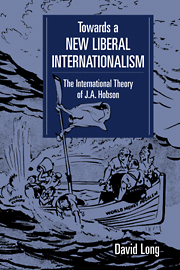Book contents
- Frontmatter
- Contents
- Acknowledgements
- 1 Introduction
- 2 Rationality, welfare and the organic analogy
- 3 Co-operation, the surplus and the theory of underconsumption
- 4 An evolutionary framework for international relations
- 5 The domestic determinants of an imperialistic foreign policy
- 6 The international relations of imperialism
- 7 Economic internationalism, free trade and international government
- 8 International government and the maintenance of peace
- 9 J. A. Hobson and liberal internationalism
- Notes
- Bibliography
- Index
- LSE MONOGRAPHS IN INTERNATIONAL STUDIES
6 - The international relations of imperialism
Published online by Cambridge University Press: 12 September 2009
- Frontmatter
- Contents
- Acknowledgements
- 1 Introduction
- 2 Rationality, welfare and the organic analogy
- 3 Co-operation, the surplus and the theory of underconsumption
- 4 An evolutionary framework for international relations
- 5 The domestic determinants of an imperialistic foreign policy
- 6 The international relations of imperialism
- 7 Economic internationalism, free trade and international government
- 8 International government and the maintenance of peace
- 9 J. A. Hobson and liberal internationalism
- Notes
- Bibliography
- Index
- LSE MONOGRAPHS IN INTERNATIONAL STUDIES
Summary
Hobson's theory of imperialism is considered a theory of international relations. Despite this, the international aspects of the theory are ignored in descriptions in international relations that use instead an extrapolation of Hobson's account of domestic variables into international relations. As Kenneth Waltz points out, to make sense of imperial expansion, control and consequent wars, an account of the international context is required. Hobson provided this, although often rather briefly and in passing. Hobson's theory is not economic determinist because, for Hobson, the international relations of imperialism was the cause of the political manifestation of the new imperialism. The source of imperialism internationally was global political and economic competition between states for territorial monopoly and between financial and industrial trusts for commercial/financial monopoly. Underlying his discussion, Hobson understood imperialism to be a consequence of
the confident belief that no real solidarity of interests exists between the various units of humanity, and that, therefore, it is possible for each person, class, or nation, to make a separate gain for himself by seizing and utilising the political and economic resources at his disposal.
It was a product of sectionalism, not only domestically or in economics, but in international politics.
Specifically, the new imperialism was the result of the political and economic competition of rival empires superimposed on the competition of trusts and cartels struggling to avoid the logic of underconsumption.
- Type
- Chapter
- Information
- Towards a New Liberal InternationalismThe International Theory of J. A. Hobson, pp. 97 - 120Publisher: Cambridge University PressPrint publication year: 1995

